Recent Water Damage Posts
How Thermal Imaging Uncovers Hidden Water Damage
10/14/2023 (Permalink)
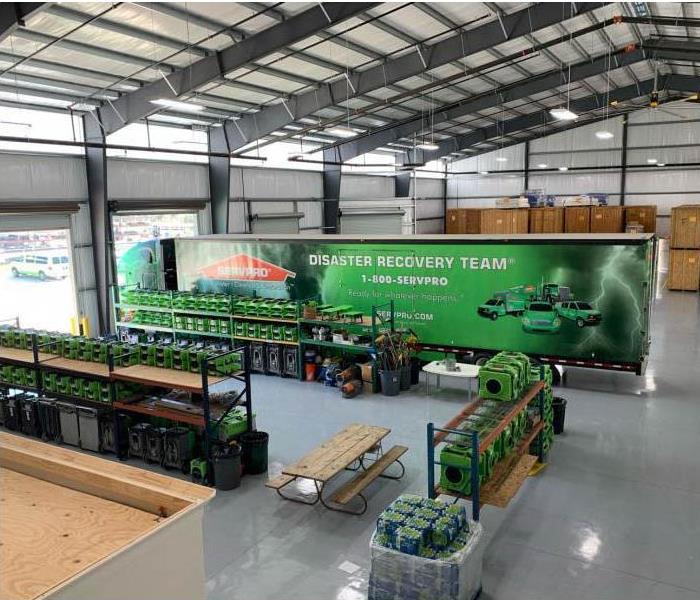 Thermal imaging plays a pivotal role in early detection.
Thermal imaging plays a pivotal role in early detection.
Water damage can be a silent intruder, hiding behind walls, ceilings, and floors until it becomes a costly and extensive problem. In Bluffton, SC, where humid subtropical weather prevails, detecting hidden water damage is crucial for homeowners. In this blog, we'll explore the significant role of thermal imaging in identifying concealed water damage and why it's an essential tool for protecting your Bluffton property.
Understanding Hidden Water Damage
In Bluffton's climate, high humidity and frequent storms can lead to water intrusion, which often goes unnoticed until it's too late. Hidden water damage can weaken structures and promote mold growth, posing health and safety risks.
How Thermal Imaging Works
Thermal imaging, also known as infrared thermography, is a non-invasive technology that detects temperature differences. It can identify areas of moisture or water damage by capturing the temperature variations caused by evaporation.
Early Detection Saves Costs
Detecting water damage in its early stages can save you from costly repairs. Thermal imaging allows professionals to identify problem areas before visible signs, such as stains or mold, appear.
Preventing Mold Growth
In Bluffton's humid conditions, hidden water damage can quickly lead to mold growth. Thermal imaging helps locate moisture sources so that they can be addressed promptly, preventing mold infestations.
Reducing Structural Damage
Identifying concealed water damage early can help prevent structural deterioration. It allows for timely repairs to restore your property's integrity.
Energy Efficiency
Water damage can compromise insulation and affect energy efficiency. Thermal imaging can help pinpoint areas where insulation is compromised, allowing for targeted repairs to improve energy efficiency.
Non-Invasive Inspection
One of the advantages of thermal imaging is its non-invasive nature. It doesn't require poking holes in walls or ceilings to detect water damage, minimizing disruption during inspections.
Professional Expertise
While thermal imaging equipment is effective, it requires trained professionals to interpret the data accurately. Consider hiring certified experts like SERVPRO® perform thorough inspections.
Routine Maintenance
Regular thermal imaging inspections, especially before and after storm seasons, can help you catch potential water damage issues early, saving you money and stress.
Thermal imaging plays a pivotal role in early detection. By identifying hidden water damage before it becomes a major issue, you can protect your property, reduce repair costs, and maintain a safe and healthy living environment. For comprehensive thermal imaging inspections and water damage restoration in Bluffton, contact SERVPRO®. Our team of experts is equipped with the latest technology to safeguard your home.
Prepare your home for Spring
3/16/2023 (Permalink)
 Prepare for Spring, spring cleaning to get rid of the old.
Prepare for Spring, spring cleaning to get rid of the old.
Spring cleaning can be a daunting task. However, if you prepare your home for the season before it gets too warm, you'll save yourself from an overwhelming mess.
Clean windows, doors and frames
Clean windows, doors and frames. Vinegar and water are an effective combination for cleaning glass surfaces. Mix one part vinegar with three parts water in a spray bottle, then use the mixture to clean your windows. Use a squeegee to remove excess water from the window and dry it with a soft cloth when you're finished cleaning it. If you want to do touch-ups after this initial cleaning process, try using rubbing alcohol instead of vinegar; it works just as well but smells better!
Clean window screens (if applicable). Screens should be removed from their frames whenever possible so that they can be thoroughly cleaned without damaging any part of your home's interior design aesthetic.
Wash your floor
Washing your floors is a great way to prepare for spring. While you're at it, give them a good scrubbing with hot water and soap (you can use dish detergent). Then wipe them down with a dry cloth in case there are any streaks left behind by the cleaning solution.
If you need more help getting rid of tough spots or stains, consider using vinegar and baking soda instead of harsh chemicals like bleach or ammonia. They're both effective at removing dirt without damaging your hardwood floors' finish.
Remove winter coats and heavy blankets from the room
Remove winter coats and heavy blankets from the room. If you have a closet or storage space that is large enough to store your winter clothing, then it's best to put them away there. However, if your house does not have enough space for this, then consider buying some extra shelves for your bedroom wall.
You could also use an old dresser drawer or chest of drawers as an additional storage place for these items during the warmer months when they aren't needed anymore. Make sure that whatever container you choose has enough room inside so that everything fits comfortably without being crammed together tightly (this will save wear-and-tear on your belongings).
Dust ceiling fans, vents, light switch covers and door knobs.
Use a duster to remove dust from ceiling fans, vents and light switch covers. You can also use a vacuum cleaner with an upholstery brush attachment on the hose attachment to clean off fan blades and other hard-to-reach areas. If that doesn't work well enough for you, dampen a rag with water or vinegar to help cut through some of the grease buildup and wipe down those surfaces until they look clean again.
Spring cleaning is a great way to get your home ready for the warm weather. It's also a great way to get rid of clutter, so you can start the year fresh and enjoy the outdoors without being bothered by clutter.
Spring cleaning isn't just about getting rid of old items, it's also about making sure everything in your home works properly. If something needs repair or replacement, now's the time to do it before summer rolls around again!
If you want to enjoy the spring, it's time to do some cleaning. This will not only make your home look good, but also allow you to breathe fresh air and feel more relaxed.
What is the Water Damage Restoration Process?
2/17/2023 (Permalink)
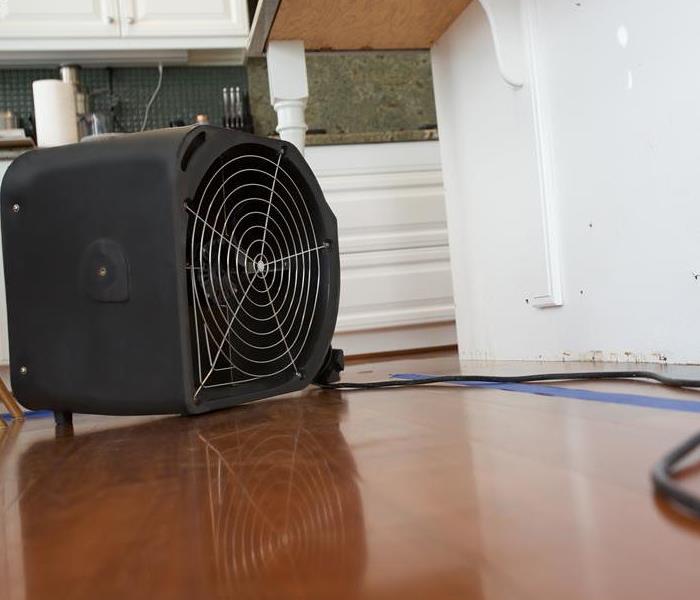 Air movers are used to help restore your property after a water damage.
Air movers are used to help restore your property after a water damage.
Water damage restoration is a complicated process that requires expertise, experience and teamwork. The water damage restoration process is organized into three stages, water removal, drying, cleaning and disinfecting. Each stage is important to the overall success of your project. It’s not something that can be completed in a single visit, or even over the course of several days or weeks. It’s a long process that requires expertise, tools and equipment to complete correctly.
Water Removal
This is where you get rid of any wet or soaked materials that have been exposed to water. Content of the property should be removed and disposed of properly. The property can also be begin the drying process using fans and dehumidifiers where necessary. They may use dry ice to help keep the room cooled down to help prevent secondary damages.
Your water damage experts will first be dispatched to your location to pump or suction standing water from the building. Once they’ve removed as much of this moisture as possible, they will begin addressing any issues caused by high humidity levels in your home or office space—often by installing dehumidifiers and fans throughout affected areas to move air more quickly through these spaces and reduce unwanted moisture buildup on surfaces such as wood floors, drywall, cabinets and appliances (like refrigerators).
Drying
Air movers, dehumidifiers, heaters, and sometimes moisture meters are put in place to help expedite the drying process. Moisture meters are used to help measure the amount of moisture in the property and damage to put together a plan of action for water removal.
The use of equipment such as truck-mounted vacuum and industrial pumps enables SERVPRO to remove large amounts of water quickly, efficiently and safely. The truck-mounted vacuum is used for large areas where there is little access or where it’s impractical to transport heavy equipment in by hand.
Cleaning
The final step is cleaning and disinfecting surfaces to remove contaminants from the area. This step is usually done by a professional, but if you're feeling up to it, you can also do it yourself. The cleaning process is done with a combination of chemicals and vacuuming. After this final step, you will be able to move back into your home again! You may still need to take care of items that were warped or damaged by flooding water, but at least now it's safe for you and your family members to live without interruption.
When water damage is present in your home, don't wait! Give the professionals a call at SERVPRO a call for your water damage restoration emergency.
3 Steps for Safely Handling a Flooded Basement
12/1/2022 (Permalink)
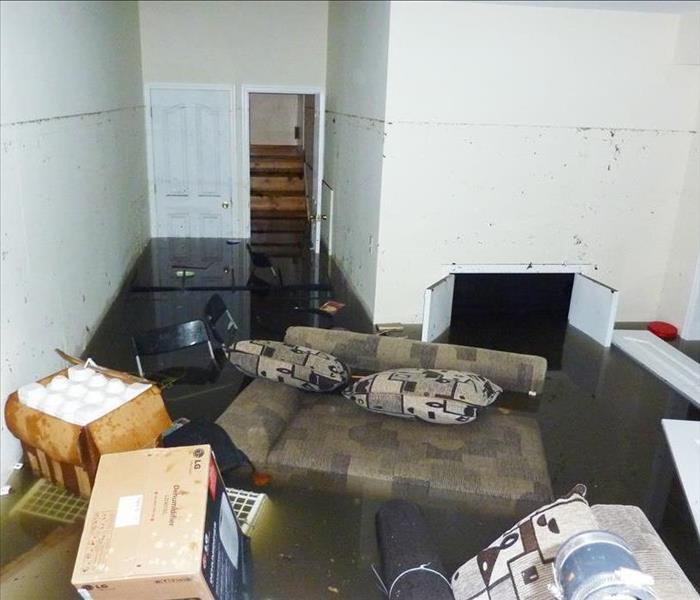 A flood in your home can be devastating.
A flood in your home can be devastating.
How To Handle a Flooded Basement
Whether your flooded basement is the result of torrential rain, a broken dam, or melting winter snows, the result is almost always the same: unwanted standing water. Here are three steps for safely handling your basement flood.
1. Switch Off the Utilities
Turning off the electricity or gas to your home may be a problem if your home’s breaker box or meter is in the basement. If so, contact the utility companies and request they turn the power and gas off. Turning the utilities off before you begin any cleanup effort can help ensure your work environment is a safe one.
2. Locate a Professional Team
Many people panic when they find their Beaufort City, SC, basement floor flooded with water. The loss of stored items, children’s bedrooms, or an extra living area with all the sundry additional items those rooms entail, can be upsetting. Calling in a professional water mitigation team can help you make sure your damaged basement has insurance coverage because the professionals often document everything they do. They can also help save as many of the basement floodwater-damaged items as possible because the knowledgeable team can help you tell the difference between what can be saved and what should probably be thrown away.
3. Remove the Standing Water
The first thing the water damage team will typically do is remove the standing water and investigate for signs of structural damage. Water removal is important because standing water can:
- Encourage mold growth
- Cause foundation damage
- Ruin walls and insulation
Once the water is gone, the team can begin cleaning and disinfecting the area, and, if needed, technicians can generally begin rebuilding the damaged areas.
A flood in your home can be devastating. Don’t let it paralyze you; instead, take the above three steps to help minimize the damage of any basement flood. You can fight back when you have a professional water mitigation team on your side.
Is There a Noise Coming From Your Water Heater?
11/12/2022 (Permalink)
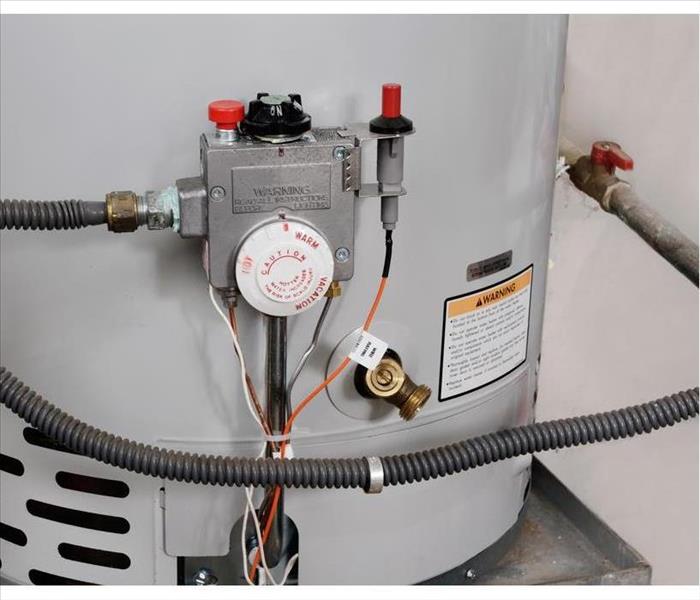 It might be time to call a plumber if your water heater is making strange noises.
It might be time to call a plumber if your water heater is making strange noises.
Is Your Water Heater Making Any Noise?
Water heaters are a staple of the home, and they can be used for decades if properly maintained. Most water heaters are installed when a house is built or remodeled, so it's likely that your home has an older model. Over time, these appliances develop quirks and become less energy efficient. The good news is that if you have an older water heater in need of repairs or replacement, it's not as expensive as you might think!
Is your water heater making noises?
- Is your water heater making noises?
- When it heats, does the water heater make a loud noise?
- When it cools down, does the water heater make a loud noise?
- Does your drain valve open and close with a loud bang when flushing out sediment or other debris that has accumulated inside of it?
Troubleshoot common issues and learn how to repair a water heater
The thermostat is one of the most common causes of water heater noise. A defective or mis-adjusted thermostat can cause the water heater to heat unnecessarily, and this excessive heating causes vibrations that can be heard as clicking or knocking sounds. If you suspect your hot water heater's thermostat is causing excessive vibration, check it for proper operation.
The pressure relief valve should never make any loud noises when heating cycle is complete, but if it does, there are a few possible causes. The gas pilot light may have been accidentally turned off while no one was home or while they were away on vacation; it's important to turn this back on before doing anything else because otherwise the pilot light will go out and leave you without heat in your house until someone remembers to relight it again!
If there are any cracks or leaks in the tank itself—or if its seams aren't tight enough together—water will seep out during periods where usage is high (i.e., morning showers), causing excess pressure inside which could potentially damage wiring components within if left unchecked long enough; resulting from these problems might include hearing strange noises coming from your system when trying something like turning on an appliance like a dishwasher (which uses lots of cold water).
Sediment or debris can cause unusual noise
When sediment builds up in your water heater, it can cause a lot of noise during its operation. This is because the sediment will rub against the inside of your water heater as it heats up and cools down. If you hear unusual noises coming from your hot water heater, there's a good chance that some debris has built up at the bottom of your unit.
The best way to deal with this problem is flush out your water heater or to call a professional plumber who can clean out any debris that may be causing trouble within your system. It isn't dangerous, but it could be causing damage if left unchecked!
If you hear odd sounds from your water heater, it may be time to call a plumber. They can help you troubleshoot the problem and get your water heater back up and running as soon as possible.
The Problem With Chemical Drain Cleaners
7/26/2022 (Permalink)
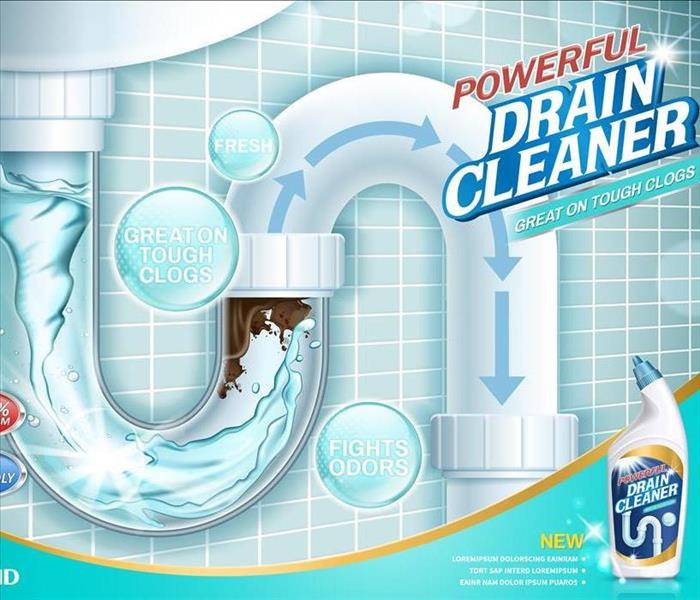 When using chemical drain cleaners you never know what the outcome will be.
When using chemical drain cleaners you never know what the outcome will be.
Chemical Drain Cleaners
It can happen to anyone in Beaufort City, SC. When brushing your teeth or washing your hands, you notice water backing up in the sink, and you find you have a clogged drain. So, what do you do? The ads on most television stations suggest you run to the nearest store and purchase a DYI chemical drain cleaner. However, is that really the best option?
The Biggest Problem
The mixture of chemicals in these cleaners is meant for strong sewage cleaning along pipes that are filled with hair, dirt or everyday miscellaneous buildup. The way to attack all possibilities at once is to produce a high enough heat that it bubbles away the problem by breaking the debris into bits that easily move down the drain. But not all pipes are created equally. Here are some problems you may encounter in your home’s plumbing.
- Fractured pipes caused by the shifting earth
- Aging pipes that have weakened over time
- Incorrectly installed plastic pipes
When the heat and force caused by the chemical interaction in the drain cleaner expand outward, the result can sometimes be disastrous for a home plumbing clogged drain, and that can be the biggest problem of all.
The Best Solution
Calling a water and plumbing specialist is typically the best remedy to a clog in your home’s pipes. The water specialist has many tools the average homeowner does not possess. These tools can help diagnose the issue quickly and efficiently, and let the specialist immediately begin work on removing the problem. Those same tools can help find more serious issues such as tree roots in the line, fragmented plumbing pieces, or badly crushed pipes. Once the issue is found, the specialist can begin making repairs.
Using a chemical cleaning agent on a clogged drain can be like playing Russian roulette – you never know what the outcome will be. Play it safe and avoid the chemicals altogether.
How To Prevent a Home Flood During Your Vacation
5/17/2022 (Permalink)
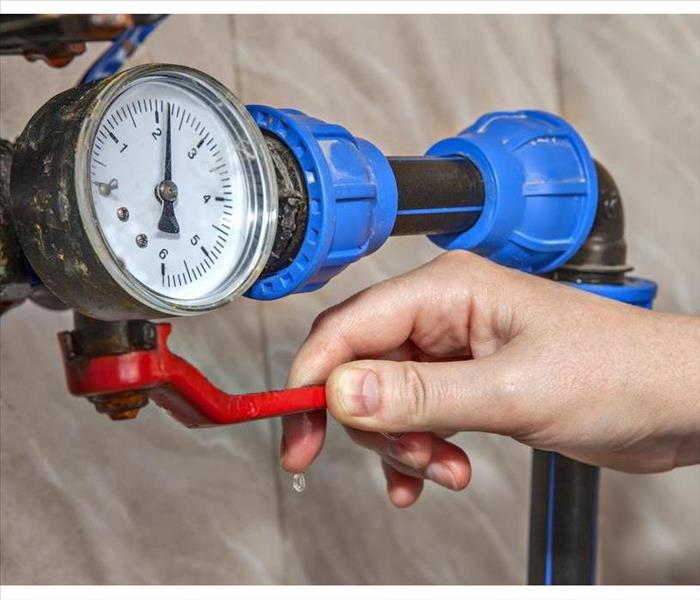 Switch off the main water valve.
Switch off the main water valve.
How To Prevent a Flooded Home
After a long vacation, you will probably need a few days to chill before going back to the reality of long work hours and deadlines. The last thing you want to do is spend the hours after your trip cleaning up a flooded home. Severe water damage can also destroy your valuables and affect the structural integrity of your house. While water pipe repair specialists can help after a disaster, you can limit your stress by preventing damage in the first place. Follow these suggestions, and you should return home to a dry property.
1. Check Fixtures and Appliances
Appliances and fixtures are common causes of leaks. You should thus inspect these parts of your home prior to vacation. If you notice any excess water or hear any funny noises, contact a professional immediately. During your inspection, pay particular attention to:
- Sinks
- Showers
- Refrigerators
- Toilets
- Dishwashers
2. Turn Off the Water
If your house will be empty while you are gone, you should switch off the main water valve. Before you leave for your trip, check the faucets to make sure the water truly is off.
3. Let Your HVAC System Run To Avoid the Need for Water Pipe Repair
Keep your heater or air conditioner running even when everyone is out of the house. This will prevent the buildup of condensation. The continually circulating air should also reduce the chances of your pipes freezing.
4. Consider a Leak Detector
There are several modern devices that can detect a broken pipe or leak in your home. The device will then alert you via phone and may even shut off your water to prevent further harm. You can find one of these devices online or in a home improvement store.
Be sure to inspect your Hilton Head, SC, house and turn off the water lines before leaving for vacation. You can then relax on your trip and not worry about whether you will have to call water pipe repair experts upon your return.
3 Steps To Fix a Leaking Kitchen Sink
4/19/2022 (Permalink)
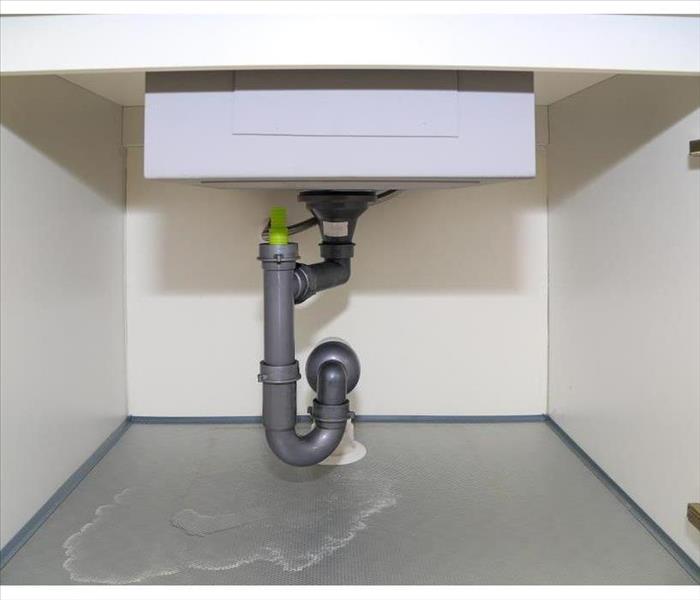 An under sink leak could have serious consequences.
An under sink leak could have serious consequences.
Steps To Fix An Under-Sink Leak
A leaky kitchen sink may seem like a minor issue, but an ongoing leak could have serious consequences. Homeowners or occupants may be able to fix a malfunctioning faucet, drain or drain seal at a residence in Beaufort, SC. A leaking supply line or other plumbing problems that could cause flooding require expert repair. Here are three steps to fix an under-sink leak.
1. Find the Source of a Sink Leak
A leaky or broken water supply line may visibly drip or spray water in a home. A P-trap or sink drain leak may only be evident after the water has run through the sink. If you cannot locate the source of a leak, shut off the water supply and contact a plumber.
2. Fix the Faucet, Drain or Seal
A leaky faucet is relatively easy to replace, along with one or two washers or gaskets. A P-trap leak may require clearing a blockage, tightening connections, or replacing a corroded trap. A sink drain leak may need to be unscrewed and repacked with plumbers putty. A broken supply line is more likely to cause Category One water damage or flooding and require expert repair.
3. Contact a Plumber If a Leak Continues
If the kitchen repair measures you take to stop a leaky sink are not effective, it is a good idea to call a plumber sooner rather than later. The longer an under-sink cabinet or other areas remain wet, the higher the risk of major water damage and mold.
A leaking sink often starts off as a drip, but a problem that goes unaddressed could end up flooding a home kitchen in Beaufort, SC. If you cannot resolve the underlying cause, contact a plumber to minimize primary damage. An under-sink cabinet that has been exposed to water for a long period of time or repeatedly may suffer primary and secondary damage.



 24/7 Emergency Service
24/7 Emergency Service







